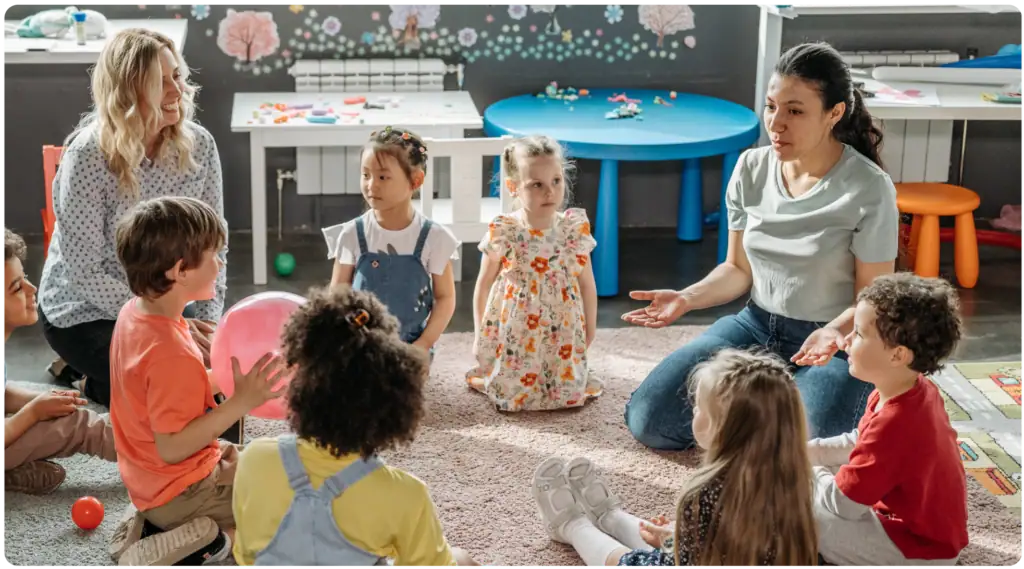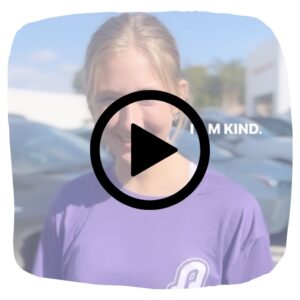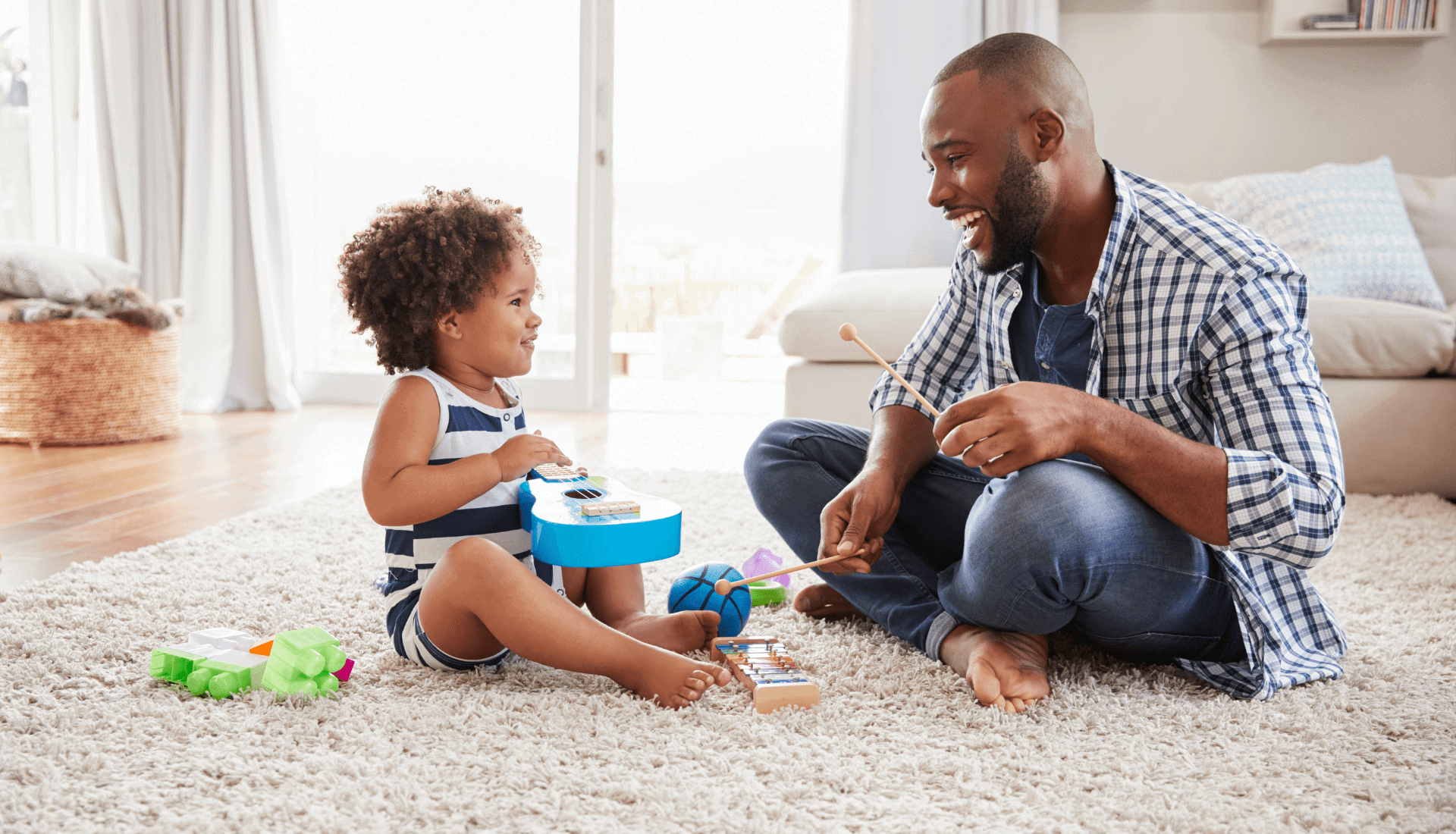Top 5 Social Emotional Activities for Toddlers
Looking for ways to help your toddler develop crucial social-emotional skills? Look no further!
In this guide, we’ll introduce you to five fun and engaging social emotional activities for toddlers that are specifically designed to promote empathy, self-awareness, and emotional regulation in toddlers.
Based on scientific research and expert insights, these activities are sure to not only entertain your little one but also support their overall well-being and prepare them for future challenges. So let’s dive in!
If you’re a preschool teacher or homeschooling parent, you’re in the right place. Minibop has preschool and homeschool curriculum resources to make teaching toddler aged children fun and easy. Check out our Baby and Toddler Music Development Guide.
The Benefits of Social Emotional Learning for Toddlers
As parents and educators, our ultimate goal is to help our children thrive in all aspects of life. While academic skills are undeniably important, social-emotional skills play an equally significant role in a child’s overall development. Social-emotional learning (SEL) encompasses the acquisition of skills such as self-awareness, empathy, emotional regulation, and social skills, all of which contribute to a child’s well-being and prepare them for future challenges and opportunities.
Numerous studies have demonstrated that children with a strong foundation in SEL tend to have better academic outcomes, more positive social relationships, and improved emotional well-being. Additionally, they possess a greater ability to cope with stress and overcome setbacks in life.
Toddlers are at a crucial stage of development, during which they are discovering themselves and their place in the world. By fostering social-emotional skills in toddlers, we can help them build a strong foundation for their future.

Some of the key benefits of social-emotional learning for toddlers include:
- Improved communication and social skills: SEL activities encourage communication and social skills, enabling toddlers to express themselves effectively and form positive relationships with others.
- Enhanced emotional regulation: Toddlers often experience intense emotions that can be difficult to manage. SEL activities help them recognize and regulate their emotions, promoting self-control and resilience.
- Increased empathy and understanding: SEL activities foster empathy and understanding, allowing toddlers to develop a sense of compassion and kindness towards others.
- Research indicates that children with a strong foundation in SEL are more likely to achieve better academic outcomes, such as improved grades and higher graduation rates.
The Role of Play and Music in Promoting Social Emotional Learning for Toddlers
Play is a vital component of social-emotional learning for toddlers. It offers them opportunities to explore, experiment, and interact with their environment, honing essential skills that will benefit them throughout their lives. Play-based learning allows toddlers to engage with social-emotional concepts in a developmentally appropriate and enjoyable manner.
Some of the ways play supports social-emotional learning in toddlers include:
- Developing self-awareness: Through play, toddlers can learn about themselves, their emotions, and their capabilities.
- Building social skills: Play provides opportunities for toddlers to interact with others, practice turn-taking, and develop their communication skills.
- Promoting emotional regulation: Play enables toddlers to explore and express their emotions in a safe and supportive environment.
- Fostering empathy and understanding: Play-based activities can help toddlers cultivate empathy and understanding towards others.
Guidelines for Planning and Implementing Social Emotional Activities for Toddlers
When planning and implementing social emotional activities for toddlers, it is crucial to consider their developmental stage and individual needs. Here are some guidelines to keep in mind:
- Start with simple concepts: As toddlers are still developing their social-emotional skills, it’s important to introduce simple concepts they can understand.
- Keep it fun and engaging: Toddlers have short attention spans, so maintaining their interest in social-emotional activities requires making them fun and engaging.
- Use developmentally appropriate materials: Opt for materials that are safe, age-appropriate, and easy for toddlers to use.
- Provide ample opportunities for practice: Toddlers learn best through repetition and practice, so ensure they have plenty of chances to hone their social-emotional skills.
1. Emotion Matching Game with Music
Playing games can be an excellent way to teach toddlers about emotions, and incorporating music makes it even more engaging. For this activity, you’ll need emotion cards depicting various facial expressions, a device to play music, and a selection of songs with different tempos and moods.
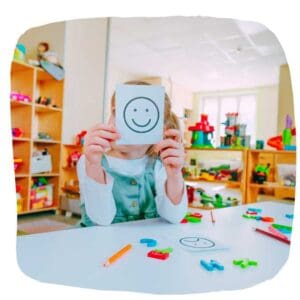
Materials:
- Magazines or printed images
- Scissors, markers or crayon
Instructions:
- Spread out the emotion cards face up on the floor or table.
- Choose a song to play and ask your child to listen to the music, trying to match the emotion on the card with the mood of the song.
- As your child becomes better at matching emotions with music, introduce more cards and songs to increase the challenge.
2. Feelings Collage with Preschool Friends
Creating collages can be a fun and creative way for children to express themselves and explore their emotions. Combining art and socialization, this activity encourages toddlers to identify and articulate their feelings with their peers.
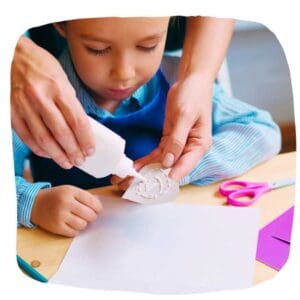
Materials:
- Magazines, newspapers, or printed images
- Glue sticks, construction paper, scissors, markers or crayons
Instructions:
- Gather a group of young friends in a comfortable setting.
- Provide each child with the necessary materials and ask them to think of an emotion they have experienced before.
- Encourage the children to look through the magazines and newspapers for images that represent their chosen emotion.
- Once they find an image, have them cut it out and glue it onto their construction paper.
- After everyone has finished, ask each child to share their collage with the group, explaining the emotions they were trying to convey through the images they chose
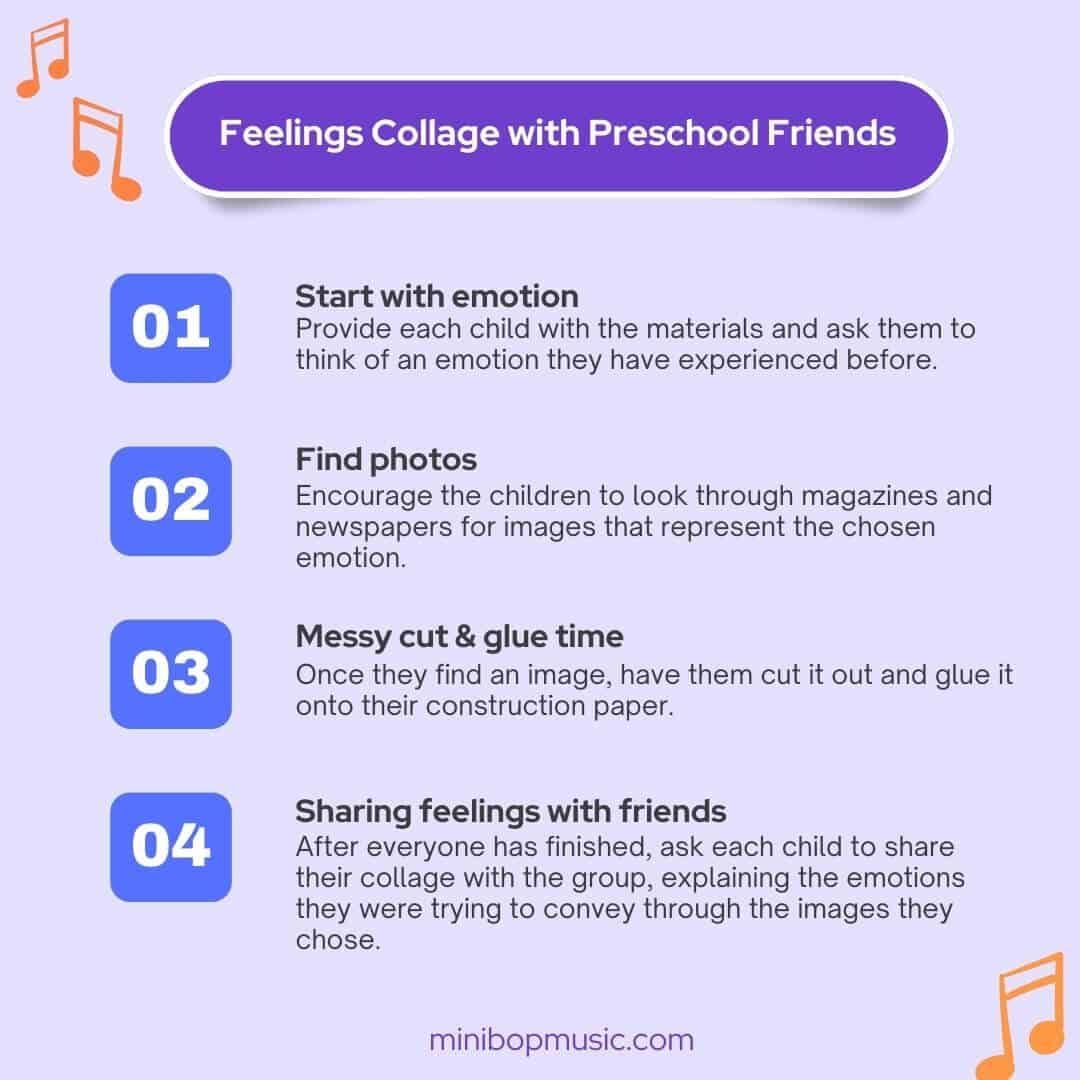
3. Empathy Story Time: Music and Movement Edition
Reading stories that focus on emotions and feelings can help children develop empathy. Combining storytelling with music and movement can create a powerful experience for young children.
Materials:
- Age-appropriate storybooks
- A device to play music
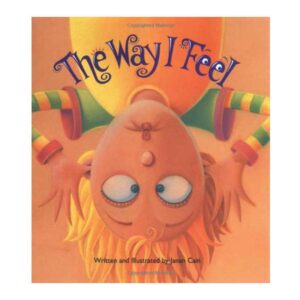
Instructions:
- Gather a group of preschool friends and find a comfortable place to sit.
- Choose a storybook that focuses on emotions, such as “The Way I Feel” by Janan Cain or “The Feelings Book” by Todd Parr.
- As you read the story, encourage children to identify different emotions and ask them how they might feel in similar situations.
- After reading the story, play music related to the emotions in the book. For example, if the story focused on sadness, play a slow and somber song. If the story was about happiness, play a cheerful and upbeat song.
- Ask children to express the emotions they are feeling through movement, such as dancing or swaying to the music.
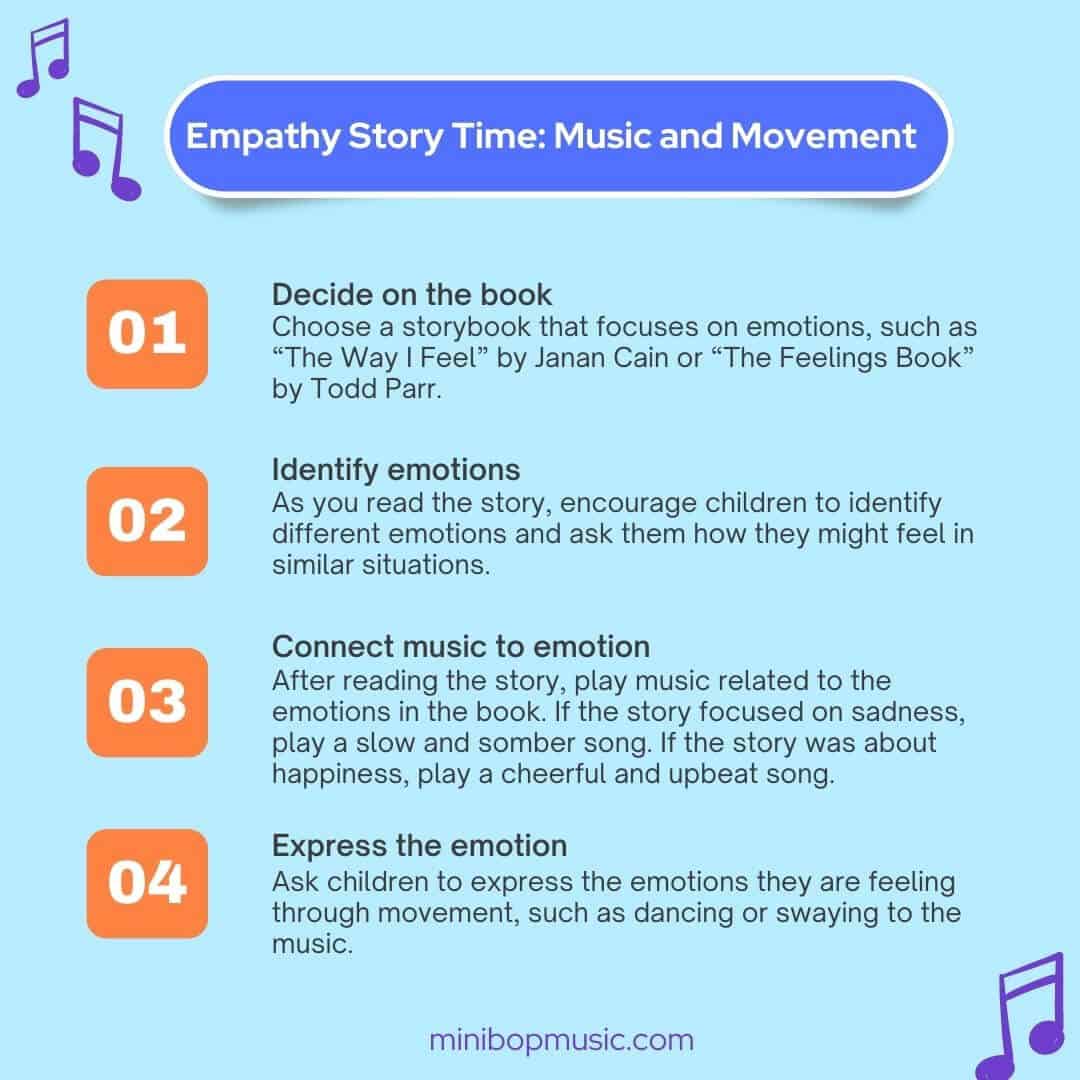
4. Mindful Breathing Through Music
Introduce mindfulness and relaxation techniques to toddlers through music and breathing exercises. This activity helps toddlers learn mindfulness and relaxation techniques that they can use when feeling stressed or anxious.
Mindful breathing has been shown to reduce stress, improve focus, and enhance overall well-being in both children and adults. Incorporating music into the exercise can enhance the calming effect and make the activity more enjoyable for toddlers.
Materials:
- A comfortable, quiet space
- A device to play calming music
- A small stuffed animal or toy
Instructions:
- Create a calming environment for your toddler by choosing a quiet space where they can sit or lie down comfortably.
- Play soothing music in the background. You can choose from various genres, such as classical, instrumental, or nature sounds.
- Ask your toddler to take deep breaths in and out while focusing on the music. Encourage them to take slow, deep breaths in through their nose and out through their mouth.
- Hold a small stuffed animal or toyand ask your toddler to do the same. Instruct them to take deep breaths and imagine the stuffed animal is rising and falling with each breath.
- Repeat this exercise for several minutes, allowing your toddler to relax and focus on their breath and the music.
Related: Prioritizing Emotional & Mental Health in Early Childhood Education
5. Positive Affirmations Through Song
Positive affirmations are powerful tools that can help children build self-confidence and self-esteem. By using music, children can internalize these affirmations and make them a part of their daily lives.
At Minibop, we believe in this so strongly that we actually have our own original song called “The Affirmations Song”.
Materials:
- A device to play music
Instructions:
- Start by talking to your child about what positive affirmations are and how they can be helpful.
- Together, create a list of positive affirmations that your child can repeat to themselves. These affirmations can be anything from “I am kind” to “I am brave” to “I am loved.”
- Play some uplifting music that your child enjoys.
- As the music plays, encourage your child to repeat the positive affirmations to themselves. You can do this by singing the affirmations together or having your child repeat them back to you.
- Repeat this activity regularly, using different affirmations and music each time.
Here are some simple affirmations to help with ideas from our music teachers:
6. Role-Playing Feelings with Toys
Role-playing is a fun and effective way to teach toddlers about emotions and social skills. In this activity, you’ll need a selection of toys or puppets and a few scenarios that will allow your toddler to explore and express different emotions.
This activity not only helps toddlers develop empathy and understanding but also teaches them problem-solving and conflict resolution skills. By practicing social skills through play, toddlers can build a foundation for positive relationships and effective communication.
Materials:
- Toys like stuffed animals or puppets
Instructions:
- Introduce the toys or puppets to your child and explain that they will be playing different characters with different emotions.
- Choose a scenario, such as a toy losing its favorite toy or a puppet feeling left out of a game.
- Encourage your child to act out how they think the character is feeling, using their own facial expressions, tone of voice, and body language.
- Once they have expressed the emotion, ask them how they can help the character feel better. Encourage them to suggest different solutions and discuss the consequences of each.
- Repeat the process with different scenarios and characters, allowing your child to explore a range of emotions.
7. Emotional Charades
Charades is a classic game that can be adapted to teach toddlers about emotions. In this activity, you’ll need a set of emotion cards or pictures and a timer.
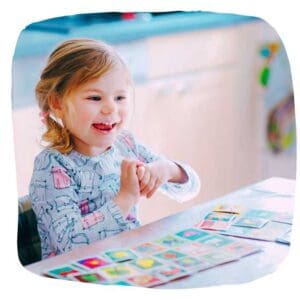
Instructions:
- Introduce the emotion cards or pictures to your child and explain that they will be acting out different emotions.
- Choose a card or picture and start the timer. Encourage your child to act out the emotion without using words or sounds.
- Once the timer is up, ask your child to name the emotion they were acting out and talk about how it feels to experience that emotion.
- Repeat the process with different emotions, allowing your child to practice expressing and identifying a range of feelings.
Conclusion: Empowering Your Toddler’s Future with Social Emotional Learning
In conclusion, these social emotional activities are designed to help your toddler develop essential skills such as empathy, self-awareness, and emotional regulation. By incorporating these activities into their daily routine, you are nurturing their emotional well-being and setting them up for success in future relationships and life experiences.
As a mom or caregiver, your love, encouragement, and involvement in your child’s social emotional development play a vital role in their growth. Stay open to new activities and resources, and enjoy the rewarding journey of watching your toddler thrive emotionally and socially.
Remember that every child is unique and may develop at different rates. If you notice your child struggling with social emotional skills, consider reaching out to a pediatrician or child development specialist for guidance and support.
Get more helpful tips and activities for your child’s social emotional development and learning with music! Subscribe to our email newsletter to a community of parents and caregivers who are passionate about nurturing their child’s growth and creativity.


